Chipotle Mexican Grill (CMG +1.48%) was one of the hottest restaurant chains in the business before the coronavirus pandemic hit. The burrito roller had been generating double-digit comparable sales growth, and had again won the acclaim of investors as the stock had more than tripled from a bottom in 2018 before new CEO Brian Niccol took the helm.
However, like every other restaurant company, Chipotle is clearly vulnerable to the outbreak and the lockdown orders, which have shut down restaurant dining rooms and forced chains to limit themselves to takeout and delivery.
Thanks to a strong start to the first quarter, Chipotle's results for the period held up well considering the impact of COVID-19. You can see the headline numbers below:
- Revenue rose 7.8% to $1.41 billion.
- Comparable sales were up 3.3% for the quarter, jumping 14.4% through February, but falling 16% in March as the outbreak spread through the country.
- Digital sales jumped 80.8% and made up 26.3% of total revenue.
- Restaurant-level operating margin fell from 21% to 17.6%, which was impacted by increased delivery expense and higher labor costs, as the company has raised wages and paid additional bonuses during the crisis.
- Operating income fell 35.5% to $71.1 million, due to lower restaurant-level margins and higher costs.
- Adjusted earnings per share fell from $3.40 to $3.08, as the company took advantage of excess tax benefits related to options and equity vesting.
As you can see, Chipotle's sales continued to surge before the pandemic hit, and the company's strength in digital has served it well, as it was forced to close most of its dining rooms and temporarily close about 100 restaurants, mostly inside malls and its 17 locations in Europe.

Image source: Chipotle.
Chipotle during coronavirus
Compared to many of its restaurant peers, Chipotle has a number of built-in advantages at a time like this, including its digital infrastructure and delivery relationships, a lack of debt on its balance sheet, and a lack of franchisees (which are particularly vulnerable right now), since all of Chipotle's restaurants are company-owned.
Chipotle finished the quarter with $909.2 million in cash and short-term investments, and after taking steps to limit its cash burn, the company said it has enough cash to sustain it for well over a year.
Since sales started falling in March, comparable sales growth hit a bottom of -35% in the week ending March 29 and recovered to a decline in the high teens in the past week, adjusted for Easter. That's an encouraging sign as Americans seem to have shifted from the stockpiling at grocery stores that was common in March and are beginning to order more takeout from restaurants, as other chains have seen a similar rebound.
On the earnings call, CFO Jack Hartung said that restaurants would operate at break-even even if comparable sales fell 30%-35%, a positive sign given that comps seem to have so far hit a trough at -35%. If they continue to decline in the high teens, the company would generate $20 million in cash flow a month from its restaurants. However, Chipotle plans to spend $30 million -$35 million in capital expenditures, and also has overhead costs for selling, general, and administrative expenses of $20 million-$25 million, meaning the burrito chain will lose money on a cash basis. In other words, investors should be prepared for a loss in the second quarter unless the economy experiences a strong reopening in May and June.
Still a long-term winner
Despite the headwinds from the coronavirus, Chipotle still looks poised to emerge from the crisis even stronger. The company bounced back aggressively from the financial crisis and could do the same here. Hartung anticipated that rents could come down and that landlords would be more amenable to having Chipotle as a tenant and accommodating things like Chipotlanes, while CEO Niccol said that the company's strong people culture should give it a hiring advantage during the recovery.
Additionally, Chipotle's digital advantage should only grow stronger as the company added millions of new accounts in recent weeks. What went unacknowledged on the earnings call is that the burrito chain could also pick up market share during the crisis as weaker chains and independent restaurants may be forced to limit growth or go out of business.
There's no question that 2020 will be a tough year for the burrito chain as management withdrew its prior guidance for the year, but the company's strong cash position and digital infrastructure means it's much less at risk than most of its peers right now.
Long-term investors should remember that the pandemic is an external challenge, much different than the food-safety crisis that hampered the chain a few years ago. A survey Niccol mentioned showed that Chipotle's customers were looking forward to visiting its restaurants at least as much, if not more, after the crisis ends. In other words, Chipotle's food, brand, and business model continues to resonate with its customers, and that should continue to deliver growth after the crisis.






